AFRICA
—Patricia Jabbeh Wesley
The calabash
now shattered
her contents
spilled
like palm wine
across the regions
of the world.
MONROVIA 2008
——— Patiricia Jabbeh Wesley (Copyright: Where the Road Turns, Autumn House Press, 2010)
On the side walk, patches of people
linger late.
In the day, they are like rice grains
along the roadways,
and at night,
they wallpaper lame bodies
in the draft darkness
of the broken city.
Crowds of war returnees,
waiting for nothing,
day after day,
waiting for nothing
after refugee camp,
after their former cities
of refuge
spewed them out like dirt,
after wandering the globe.
After death’s passing,
they have returned
looking like returnees
from the dead.
The city is hot, burning like steel
with hunger.
The air used to belong to us here
one woman said,
there used to be a road
to take us back home.
Today, the road homeward is now lost
The road to Cape Palmas, filled
with dry bones.
But on the street,
a motorcade is coming.
Someone is living.
Someone is living on these bones.
—–Patricia Jabbeh Wesley
At night, it is like fire
spreading beneath us.
This vast city
aflame, and the plane groaning.
The city is more beautiful
from the sky at night.
At noon, it looks like
a worn-out garage,
a thing in the middle
of swamp country.
All the buildings are worn-out,
rusted to the bone
of steel, twisted
to make way so life
can go on.
Everything is bent and broken
along the hilltops.
I touch air to see if air
is still there.
The touchdown,
and we appear all worn-out,
too, like the city, broken.
All the birds
moved out long ago.
The trees too.
.
BLOGGING:
BRINGING CLOSURE
— Patricia Jabbeh Wesley (copyright: The River is Rising Autumn House Press, 2007)
Closure is such a final thing- the needle in the arm,
one last word or no last word at all, a death chamber
where the supposed convict lies waiting so the poison
will descend or ascend to the heart, a final beat,
and then sleep, that eternal thing none of us living
has ever seen. In California, today, a man is being
put to death, but outside, his supporters wait; candles,
flames, anger- the cold chill of death and life,
and a country that waits for all the arguments to die
or live on. The victim’s mother will see closure today,
they say, and move on after the murderer or the supposed
murderer is laid to rest with her son, side by side.
Death is such an ironic thing to know. To know death
is to know rot, hush, the lack of pain. It is 3 am
in Pennsylvania. Time, so deceptive, and arbitrary
and imperfect. Around the world, we all wait, for
the executioner’s poke into vein, blood meeting poison.
We are such civilized people, I’d say, dishing out death
in small poking needles. The newsmen tell us they
cannot find his vein. The awkwardness of asking the one
awaiting death to find his own vein so they can murder
him too- the executioner’s awkward fingers, the knowing
fingers- afraid of both the man and the art of killing the man.
I hate death. I hate the dying, the ugly process of dying,
the ritual of murder. So I too, keep vigil on my carpet.
Tomorrow, I’ll tell my eleven year-old daughter how
we have all murdered another human being. An eye
for an eye, so far away from my bedroom of dim lights,
a comforter or two, the surrounding hills in close view.
There is always a mountain here in Pennsylvania,
always that looming presence of life and death and the
far away feeling of the valley below, of being so far away
from home. There is no closure, I see, after the poison
has reached the heart, and the accused, stretched out, finally.
The victim’s mother begins to weep all over again-
as if this was just the beginning of the dying.
____________________________________________________________________________________________
I NOW WANDER (Copyright: Becoming Ebony, SIU Press, 2003
Patricia Jabbeh Wesley
I raised ducks, pigs, dogs, barking watchdogs.
Wild chickens loose, dancing, flapping old wings.
Red and white American roosters, meant to be sheltered
and fed with vitamins until they grow dumb;
in our yard I set them loose among African breeds
that pecked at them until they, too, grew wild and free.
I planted papayas, fat belly papayas, elongated papayas,
tiny papayas, hanging. I planted pineapples, mangoes,
long juicy sugar canes, wild coco-yams. From our bedroom
window I saw plantain and bananas bloom, again and again,
take on flesh and ripeness. And then the war came, and the rebels
slaughtered my pigs, my strong roosters, my hens,
my heavy, squawking ducks. Now I wander among strangers,
looking for new ducks, new hens, new coco-yams, new wars.
____________________________________________________________________________________________
THE WOMEN IN MY FAMILY
Patricia Jabbeh Wesley
The women in my family were supposed
to be men. Heavy body men, brawny
arms and legs, thick muscular chests and the heart,
smaller than a speck of dirt.
They come ready with muscled arms and legs,
big feet, big hands, big bones,
a temper that’s hot enough to start World War Three.
We pride our scattered strings
of beards under left chins
as if we had anything to do with creating ourselves.
The women outnumber the men
in my father’s family, leaving our fathers roaming
wild nights in search of baby-spitting concubines
to save the family name.
It is an abomination when there are no boy children.
At the birth of each one of us girls, a father sat prostrate
in the earth, in sackcloth and ash, wailing.
It is abomination when there are no men
in the family, when mothers can’t bring forth
boy children in my clan.
____________________________________________________________________________________________
WHEN I GET TO HEAVEN
Patricia Jabbeh Wesley (1998, Before the Palm Could Blook
When I get to heaven
I’m going to shout hallelujah all over the place.
Dancing the Dorklor, the Wahyee,
the Ballet, the Rock and Roll.
I’ll dance the Brake, the Rap, Hip-Hop.
All the dances only sinners have danced.
I’ll sing Opera, the African way,
dance the Ballet the African way.
When I get to heaven
I’ll pray so loud, shaking hands the White way,
the Black way; greeting with kola nuts
as the Grebos do.
I’ll lie prostrate, to greet
the Yoruba way. Snap fingers to greet
as Liberians do.
There will be no boundaries, law laws, no rules.
When I get to heaven
I’ll sing the blues and dance the Sumu.
I’ll paint my face with white chalk and red rock,
sit with missionaries so all can see
I’ll pound my drums, shaking my Sahsah.
Blowing my trumpet the African way
Dancing to Jesus the African way
_____________________________________________________________________________________________
WHAT DIRGE
–Patricia Jabbeh Wesley
So what shall I use to wipe my brow?
To bring back a life
snatched away in its prime?
What shall I say, and what shall I lay hands
so helpless upon to wipe the sorrow
from my brow?
What shall I wear to mourn a life
whose end has dealt us this blow?
Shall I wear black, so when our townswomen,
hearing the drums, come wailing, wailing
they shall see the sorrow
of my heart on my dark lappa?
Shall I tie a string around my forehead?
Shall I lie prostrate on The Mat?
Shall I cry tears for those you’ve left us to feed
when we ourselves cannot feed ourselves
in a land where the hungry, forever hungry,
keep the faith?
What dirge shall I sing?
Shall I recount the battles fought at Nganlun?
Shall I sing of blood shed at the cracking of a gun
when I myself am so afraid of the gun?
What shall I say when the women,
hearing my song, come wailing
and knocking at my door?
_____________________________________________________________________________________________
FINDING MY FAMILY
Patricia Jabbeh Wesley
“Good friend, please help me.
Did you happen to see
two boys when you lived in Kataka?
One dark, chubby?
The other, light with dark eyes?
Good friend,
did you see them while you lived in Ganta?
One would have been ten
and the other this tall.
My big boy, Nyema, the small one, Doeteh.
Good friend, can you tell me
if they went to Tapeta?
Were they given weapons, did they kill?
Good friend, can you say
if they walked to Bassa?
Did they starve to death?
Good friend, can you say
if there was a mother walking by their side?
Was she healthy? was she treated well?
Oh, good friend, so this is where
they took them out of line?
Good friend, were they hungry
when they met their end?
Oh, good friend, I will follow
to wrap up their bones.
Thank you, good friend.
But how will I know their bones?
____________________________________________________________________________________________
POETRY ABOUT OTHER COUNTRIES:
MEDELLIN, 2007
—-Patricia Jabbeh Wesley
Medellin, Oh, Medellin…
to God, I wish I could take out my heart for you,
but how will I sing this song to you without a heart?
You, with so much heart for love and poetry,
for hope in the eyes of the little girl
who with a scrap of white paper, wants me to say a word
to her, to autograph my name for her, to write it in her
name. She tells me with that unusual smile how
she loves my poems, but she is only eight years old.
She and Carlos, the five year old brother who have
pushed through the thousands to get to me.
Medellin, Oh, Medellin…
where we go down from the mountain
into the bowl of a city, into the deep heart of a city,
so warm, a city where people still smile
and clap to a poem, and cry for the war, a city
where concrete houses hold up the hills with muscles
of steel, muscles of pain, and somewhere along the roads
as the bus descends from the airport, the poor have
erected their own lives so sadly, waiting,
and yet, they overlook the city with hope.
From the edge of sharp cliffs and the side roads,
the burning lights and flames of the city, hard
and indistinguishable from anger.
But theirs is of the pain from the years gone.
Medellin, Oh, Medellin…
Waiting can be so hard, Medellin.
And I love you from my heart. I love your laughter,
your warm hugs and kisses, your Spanish, so simply
plain and warm. I love even your tears that
you have shared with me, when a poem I’m reading
touches you in that place where only a poem can go.
At the International Poetry Festival, you sit there,
along your hill arena, clapping, thousands of people,
sitting and thinking and listening and hoping,
Medellin, I have never seen anything like this before.
Thousands of people sitting for long hours
at a poetry reading, Medellin…
we wait for that day, Medellin, we wait.
Trust me, I know how to wait, and I know you do too.


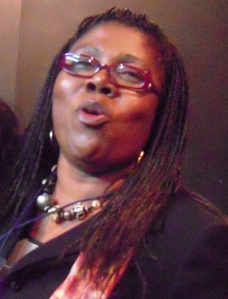

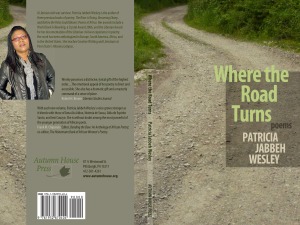


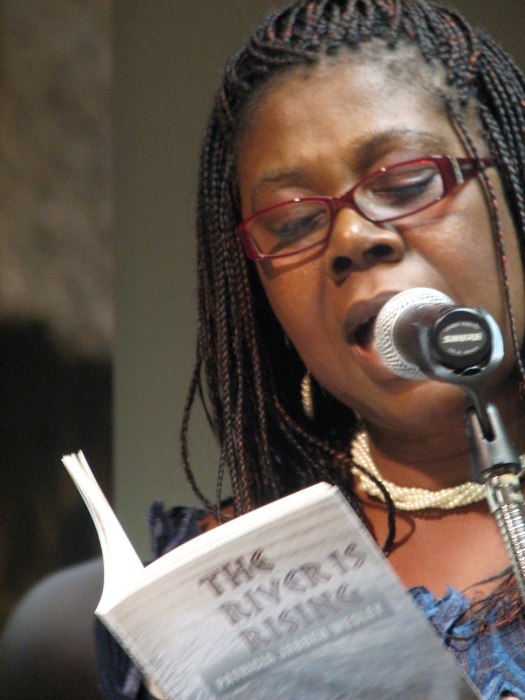
 It’s interesting when art and poetry merge: The woman in the painting is like a new competition in the world of poetry reading. I love this photo of her taking over the mic from me even though she’s only in the picture.
It’s interesting when art and poetry merge: The woman in the painting is like a new competition in the world of poetry reading. I love this photo of her taking over the mic from me even though she’s only in the picture.

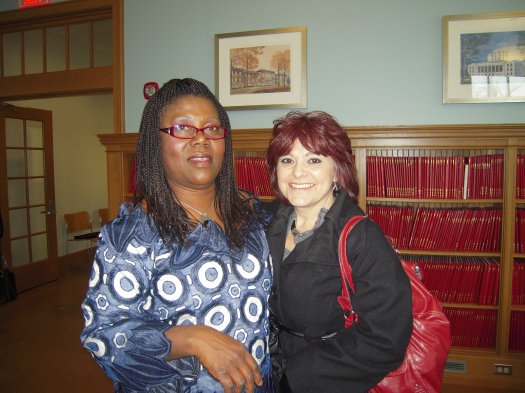

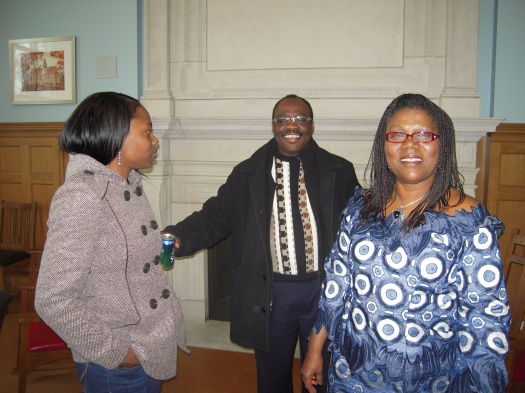

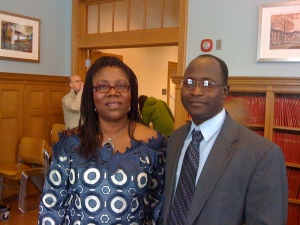


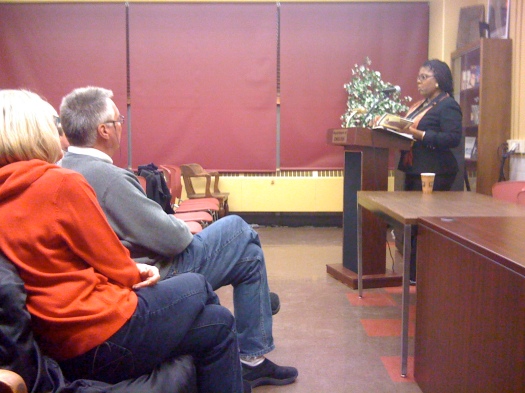








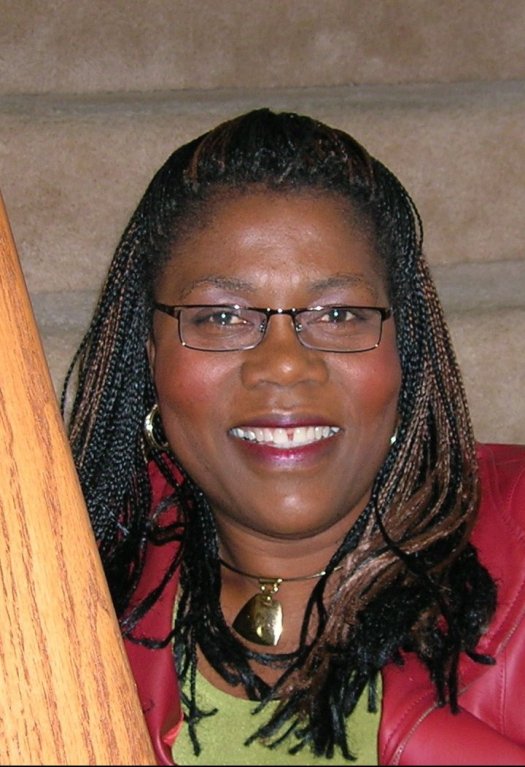


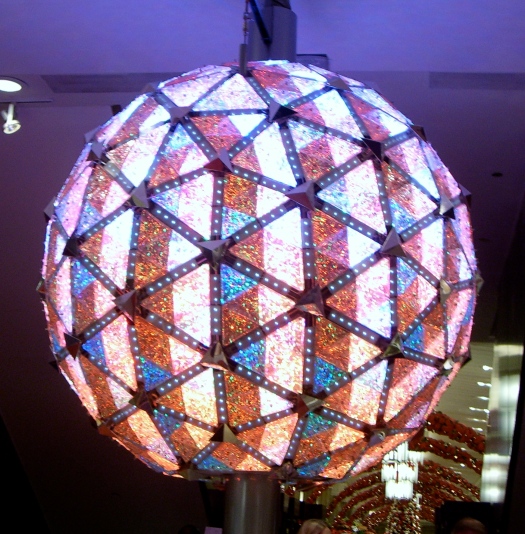







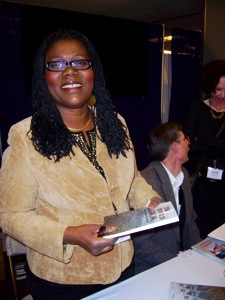

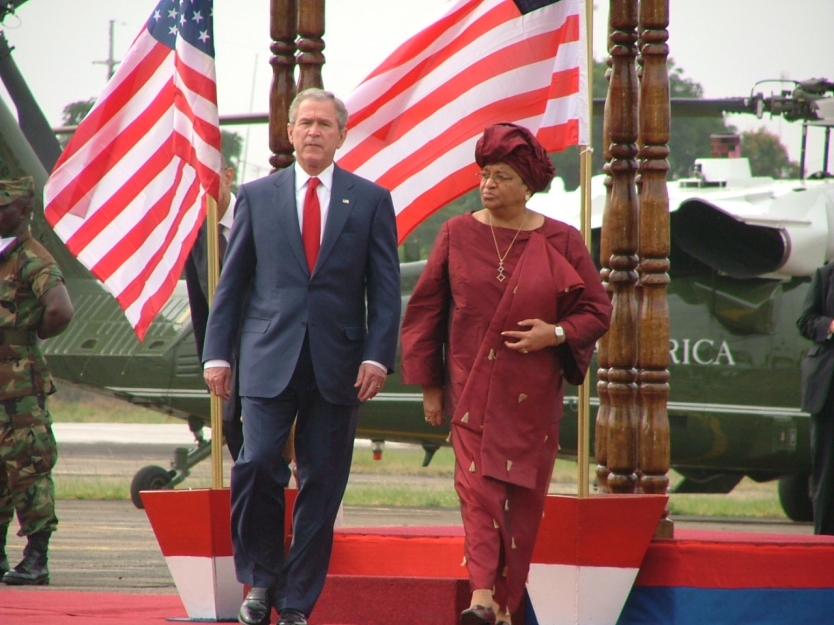
You must be logged in to post a comment.